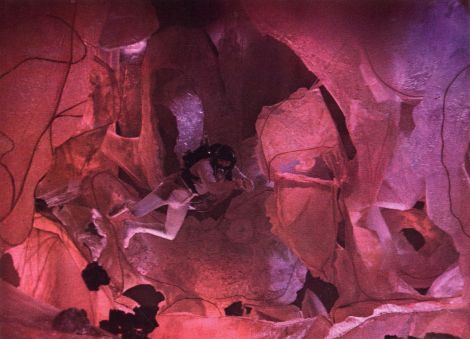
Torture, simplicity and constipation
This is the first time delving into any Japanese literature beyond Murakami, and Endo has impressed me. Mainly an autobiographical sort of writing – not unlike the Russian literature I was reading a few weeks back – Endo tackles the issue of growing up as Christian Japanese and explores how this identity has had impact on his life.
His descriptions of the persecutions Christian Japanese faced in the 17th century are quite simple, yet brutal. There are many references to the small cells that the Christians were often placed in, and these small spaces are in stark contrast to the vast spaces that Endo’s narrators encompass. Here’s an example:
When the group reached Shimabara, four of them were placed in a cell barely three feet tall and only wide enough to accommodate one tatami.* The other three were jammed into another room equally cramped.
- tatami: a type of Japanese floor-mat
Along with the small cells, the different methods of torture used on the Christians in an attempt to force them to apostatize are quite unsettling. Endo’s stark language says to me, as a reader, that he finds it difficult to talk about these events in a poetic way. Of course, we always have to take into consideration the differentiation in translation, and any lost meaning the transcription of phrases from Japanese into English can cause.
One particular scene I think stands on its own, whether in Japanese or English.
In the Autumn of that year, fourteen or fifteen new prisoners arrived unexpectedly. They were children from Takashima. The men were surprised at this strange move by the officials, yet pleased to be able to see some of their relatives after so long a time. But soon they were forced into the realization that this move was part of a psychological torture they came to refer to as ‘child abuse.’
Occasionally the prisoners heard weeping from the adjoining cell, where their children were incarcerated. One afternoon a prisoner named Fujifusa pressed his face to the tiny window of the children’s cell and saw two emaciated boys catching dragonflies and stuffing them into their mouths. It was obvious that the children were being given scarcely anything could be called food. The other men listened to this report and wept.
Heavy. This, combined with frequent reading about Soviet POW camps, makes me think my consciousness seeks out these morbid histories. Stained Glass Elegies, like most books I read, was picked up, by chance, at a market. There’s so much to read it’s hard to pick, so I let random chance determine what it is I end up reading. So far it’s worked out quite well.

Shot from the Fantastic Voyage, 1966
One story in this short collection is not like the others. Called ‘The Incredible Voyage’ Endo re-imagines a futuristic 2005 (odd, right?) where doctors are able to shrink ‘to the size of a flea’ and enter into a patient’s body to cut away cancer. Imitating a Western cult classic, the 1966 film ‘Fantastic Voyage’, Endo’s story leads with a doctor who’s in love with his colleagues’ beautiful sister.
She’s diagnosed, at first, with tuberculosis (she’s been coughing up blood) but upon further investigation, it’s revealed she as a rare cancer which is located between the heart and her right lung. Not to fear, because using ‘micro-rays’, a team of three doctors are shrunk down to enter her bloodstream and cut away the tumor with electric scalpels. The doctor in love with the girl is a part of this team.
In a strange (extremely strange) turn of events, the team enters the girl in a tiny submarine and proceed to cut away the cancer. On the return journey they drink a celebratory whiskey, the driver gets a bit too tipsy, and they lose their way inside the girls body. They end up in the large intestine, where they duel with a thread-worm (I told you, it’s bizarre) and eventually realize that they’re going to have to exit the girl through her anus.
All awhile, this doctor in love with the patient is ruminating on how strange it is to see inside a loved one. After digging their way through the constipation lodged inside the girl, because the nurses forgot to clean her out, they have to make the patient fart so as to be expunged from the intestine.
The four men no longer had the energy to go back the way they had come. Unless something were done, however, Dr Inokuchi – the pride of the K. University Medical Centre – Dr Hirano, Goichi and Bontaro would all die a miserable death in the faecal matter inside the intestines. A miserable shitty death.
This odd story, placed alongside these ruminations of Japanese Christians in the 17th century, is just plain…weird. Critics note that it was Endo’s attempt to show how his writing had been influenced by western culture, and there’s something in the crass nuance of the story that makes me think Endo was not only imitating the style, but somehow gently mocking it.
A strange kind of genius, a man who writes about a ‘miserable shitty death.’

I love Shusaku Endo. Thank you for this.
LikeLiked by 1 person
No worries! I love it too, any other works of his you’d recommend??
LikeLike
Deep River! Love.
LikeLiked by 1 person
I’ll check it out!
LikeLike
A shitty death. A great line!
LikeLiked by 2 people
My favourite from recent readings!
LikeLiked by 2 people